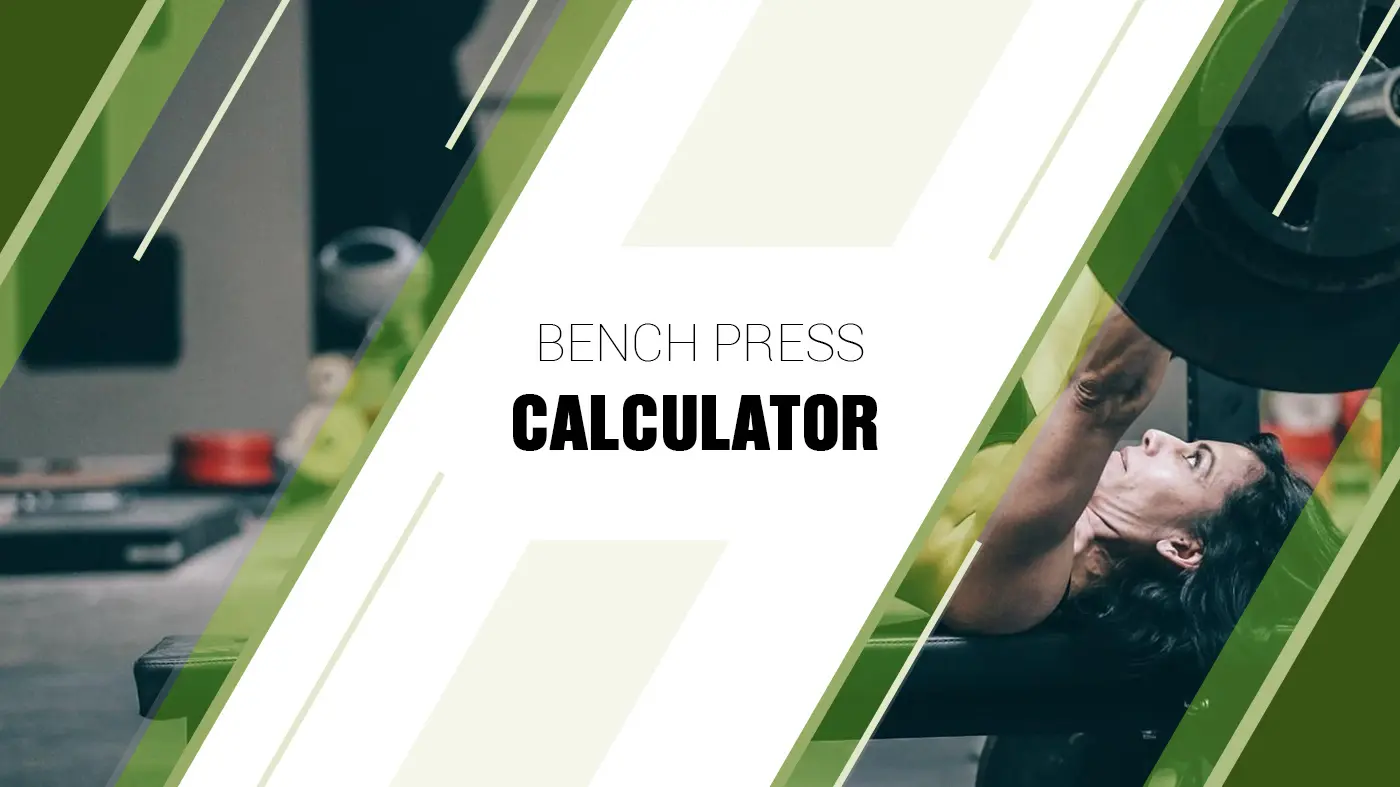Want to know your bench press potential without the math? Our calculator simplifies the process. Enter a weight you can comfortably lift for a few reps, and instantly get your one-rep max.
Weight Lifted:
Number of Reps:
1RM Equation:
Unlock Your Bench Press Potential with Our Calculator
Tired of complex formulas? Want to train smarter, not harder? Our bench press calculator makes it easy! Here’s how it helps you:
- Estimate Your One-Rep Max: Discover your true strength potential, setting goals and tracking progress over time.
- Plan Smarter Workouts: Use your results to choose the right weights, maximizing gains and avoiding injury.
- Find Your Perfect Training Program: Many programs are based on your 1RM. Our calculator is the first step to finding the right one.
- Brag with Confidence: Next time someone asks how much you bench, know your answer – and the work behind it!
Quick Tip: Choose a formula from the calculator (like Brzycki) and input a recent weight-and-reps combo. Boom! You’ve got your estimated 1RM.

How To Most Accurately Test Your One-Rep Max
Testing your one-rep max using submaximal testing is typically safer and more optimal for less experienced lifters. However, depending on the weight used (percentage of one-rep max), it’s obvious that it may not be as accurate as it would lifting near a higher percentage or by actually doing maximal testing.
For example, the further away from your one-rep max, the less accurate your results are likely to be. That’s why it’s recommended to not go above 10 reps when trying to get a decent estimate. And ideally, 3-6 reps is where you should test. (1, 2)
Level of training experience and the body composition of the individual play a big role in the accuracy of testing. For example, newer lifters haven’t yet accustomed themselves to heavy loads and therefore their nervous systems haven’t adapted to the heavy training.
The best way to test one-rep max is to actually do it, however, this should be reserved for the more experienced and done infrequently.
Bench Press Calculator Equations
So there are actually eight equations that you can use with our bench press calculator of which we’ve listed below with the formulas for each…
- Brzycki – weight × (36 / (37 – reps))
- Baechle – Weight × ( 1 + ( 0.033 × Number of repetitions ) )
- Epley – weight × (1 + 0.0333 × reps)
- Lander – (100 × weight) / (101.3 – 2.67123 × reps)
- Lombardi – weight × reps ^ 0.1
- Mayhew – (100 × weight) / (52.2 + (41.9 × e-0.055 × reps))
- O’Conner – weight × (1 + 0.025 × reps)
- Wathan – (100 × weight) / (48.8 + (53.8 × e ^ -0.075 × reps))
Now, you’re obviously going to get varied results depending on the equations used. Although, one or more equations may yield the same results even with varying percentages of one-rep max (e.g. 50%, 60%, 70%, 75%, 80%, 85, 90%, 95%).
For example, if using the same inputs of 140lbs x 5 reps to determine your one-rep max, the Baechle and Epley equations will both show 82 pounds as 50% of that one rep max which was 157 lbs. You’d also get the same results with the other percentages as well (e.g. 60%, 70%, 75%, 80%, 85, 90%, 95%).
If you went by the Mayhew equation with all else being the same as the example mentioned above, 83 pounds would be calculated as 50% of your one-rep max.
This is only one example though. If you play around with the numbers (e.g. weight lifted for number of reps), those two equations (Baechle and Epley) that previously yielded the same results across the boards may now vary depending on the percentage of one-rep max.
The Baechle equation may give you 167 pounds as 80% of your one-rep max while the Epley equation may give you 168 pounds as 80% of your one-rep max. So, it really just depends as there are different variables taken into consideration.
And the formulas are also created using several different variables. It can get really complex but continue reading for the equation we recommend. Although, you can definitely experiment for yourself as well.
Which Equation Is Most Accurate?
The most common is undoubtedly the Brzycki from Matt Brzycki and based on the evidence, it also seems to be the most accurate overall. (3)
It also happens to be the first, default equation in this bench press calculator. But the Epley and Baechle are apparently also commonly used. This doesn’t mean the other formulas aren’t good and you may find one that is more accurate for you based on the many different factors mentioned above.
After all, you do have the luxury of seeing the results for all equations with the bench press calculator.
What’s The Proper Way To Estimate One-Rep Max On The Bench Press?
The bench press should be performed using a full range of motion (no half reps) with proper technique and no cheating. You can do this using a barbell or dumbbells although the former typically allows you to lift the most amount of weight possible. However, it’s totally up to you. But, you’ll need to calculate it separately.
What Is The Best Way To Increase One-Rep Max?
A good bench press program that focuses on strength can do wonders for your pressing strength and consequently, improve your one-rep max.

But by simply benching a few times per week consistently, and implementing progressive overload, you’ll get stronger in this lift. Take longer rest breaks in between sets and do the bench press first in your workouts when you’re at your strongest.
A good diet heavy in protein and sufficient carbs is also very important so that you have plenty of energy and enough materials to repair and rebuild your muscles which will have a positive effect on your training.
Also, don’t forget to include deload weeks in there after several weeks of heavy training either because you won’t be as strong otherwise, therefore, affecting your numbers. And don’t always train near your max weight either. This increases your risk of injury and is just overall taxing on your body.
Just be patient and push yourself a little more every week while avoiding overtraining which could set you back.
Who Should Test Their One-Rep Max Bench Press?
Anyone from powerlifters to bodybuilders, regular gym-goers, and those new to training can effectively benefit from the utility of this bench press calculator.
But how much weight you lift in testing your one-rep max will obviously come down to several factors which include…
- Experience level
- Goals
- Health
- Current training regime
- Ability to recover
As you can see, there are several different variables that need to be taken into consideration. A powerlifter will likely have a more optimal training program that’ll allow them to more safely and effectively test their one-rep max closer to the actual number.
Someone new to training or those who cannot lift heavier loads will obviously need to test using a lower percentage of their one-rep max.
The ability to recover and the goal of the individual may also be a bit different and therefore, the bench press calculator is suitable for determining an appropriate estimate.
Now, if you do have any injuries then it’s advised to not test one-rep max although it depends on the injury and the percentage of one-rep max tested. Obviously, if you’re suffering from a shoulder injury, you don’t want to be maxing out or lifting anywhere near your max.
Lastly, you may not be interested in ever lifting maximal loads but this tool can still be useful if you want to have an idea of just how strong you are.
Related Calculators:
Wrapping Up
Use this bench press calculator to effectively estimate your one-rep max. There are many different variables that’ll determine your numbers including the equations. But as you get to know your capabilities a little bit better, you can better use this tool to your advantage to get the most accurate results possible.
Tip: If you're signed in to Google, tap Follow.










muscle building